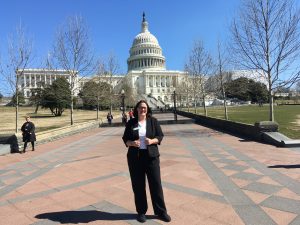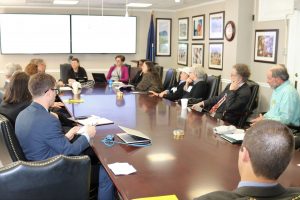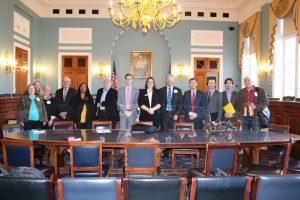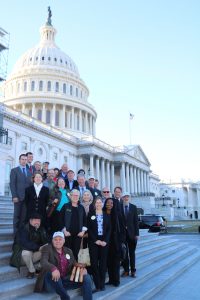Last month, I had the privilege to travel to Washington DC and meet with our Federal lawmakers about issues important to organic farmers. I am a newly elected organizational member of the Policy Committee of the Organic Farmers Association (OFA). OFA is a national lobbying organization that represents the voice of organic farmers to the Federal government. Farmer members of OFA gather and set policy priorities each year that guide the lobbying efforts of OFA’s small but mighty staff. As an organizational member, my role is to advise and support the decisions undertaken by the farmer members.
 This was my first experience lobbying in DC. I have been to our nation’s capital a number of times as a tourist and to attend marches and demonstrations. This was my first foray into the offices of government, and it was invigorating!
This was my first experience lobbying in DC. I have been to our nation’s capital a number of times as a tourist and to attend marches and demonstrations. This was my first foray into the offices of government, and it was invigorating!
The Policy Committee annual meeting was a full day of reviewing policy submissions. Over 65 policy positions were submitted by the membership of OFA and the Policy Committee was tasked with reviewing, amending, and accepting high priority policy positions for the next phase of the policy process. After our work was complete for that day, we had a refined list of policy positions that will be sent back to the farmer members of OFA for a vote to ratify the 2019 policy platform.

The following day was dedicated entirely to meetings with lawmakers and members of the administration. OFA Executive Director Kate Mendenhall and OFA Lobbyist Mark Rokala prepared a list of talking points for OFA members to use in our meetings with lawmakers and administrators. Our goals were to stress the following:
- Urge NOP to create an import monitoring system to detect and reject fraudulent organic grain imports;
- Ensure Organic Research and Extension Initiative grant funds are fully funded, leverage direct farmer participation in projects, and are accessible to non-profits;
- Urge NOP to ensure Pasture Rule compliance (grazing) by all high-risk dairies;
- Expedite rule making process for the Origin of Livestock rule;
- Improve annual reporting on use of Organic Certification Cost Share;
- Fully appropriate authorized Farm Bill funds for FY 2020 for NOP, Organic Transitions Program, and the Organic Data Initiative.
With these talking points in hand, the members of OFA met with staff from USDA’s National Organic Program, National Institute of Food and Agriculture, the senior advisor for the House Ag Committee, staff of the Senate Ag Committee, and Congresswoman Plaskett, chair of the House Ag Subcommittee on Biotechnology, Horticulture, and Research. These meetings proved to be fruitful in creating relationships between these government officials and actual working organic farmers who they are tasked to serve.

I also met with staffers from Senators Tammy Duckworth and Dick Durbin’s offices. These agriculture legislative assistants listened very carefully to the priorities of OFA and Illinois organic farmers and both indicated that the senators are supportive of and responsive to the needs of organic farmers in Illinois.
After the intensity of the lobbying day, we all gathered for a reception at the Stewart R. Mott Foundation House which is only a few short steps from the Capitol building. The reception was well attended and was a great close to a busy day. I even had the opportunity to run into Illinois’ own Wes King who is Senior Policy Specialist with the National Sustainable Agriculture Coalition (NSAC).
It was an honor and a privilege to represent Midwestern organic farmers to both the Organic Farmers Association and to lawmakers and administrators in the Federal government. I was in awe of the brilliance, passion, expertise, and history that gathered together for these events.
Organics has undergone some deep challenges in recent years – including the rise of fraudulent organic grain imports and the certification of mega-dairies, hydroponic production systems, and chicken CAFOs – but there is so much going well in our industry, too! Consumer demand is at an all-time high. The new class of lawmakers elected at the 2018 midterms are more committed to organics than ever before. The 2018 Farm Bill included great wins for the industry. Banding together like we did with OFA in DC is how we keep the good going forward and help mitigate the challenges we’re facing as an industry.
If you are not already a member, I urge you to join the Organic Farmers Association and lend your voice to these important conversations.



